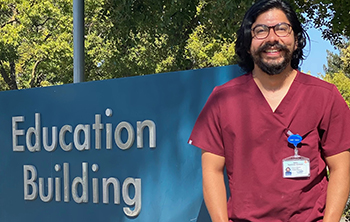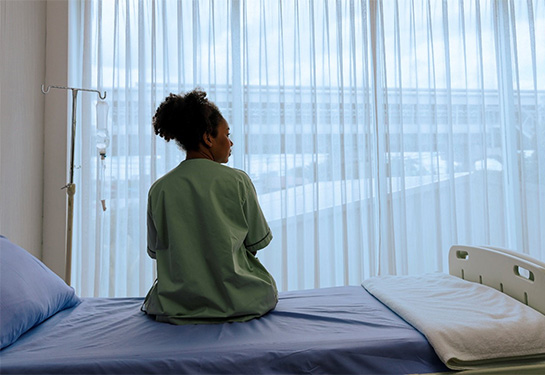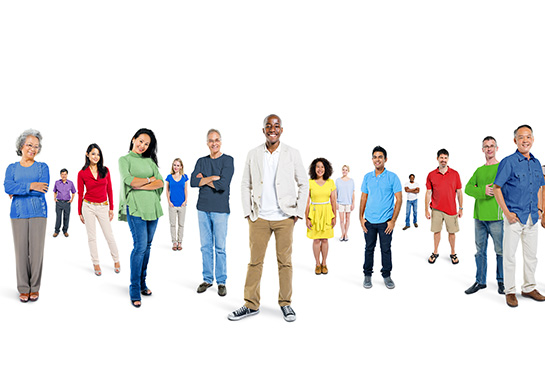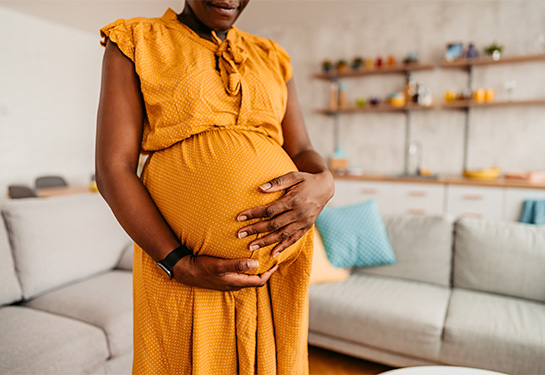COVID-19 pandemic inspires students to pursue medicine and help underserved communities (video)
This video is best viewed in Chrome, Firefox or Safari.
SACRAMENTO — At the onset of the pandemic in 2020, Alexander Baltodano started work as an emergency medical technician. Day after day, his crew rushed acute COVID patients to hospitals in the Napa Valley.
He noticed that the coronavirus was adversely affecting people from underserved communities who lacked primary care providers. As a result, many patients didn’t seek medical attention until they were gravely ill, which troubled him.
The experience influenced Baltodano’s desire to be a doctor – he’s now a first-year student at the UC Davis School of Medicine.
Baltodano applied for school earlier than he initially planned. “I just wanted to be part of that solution now rather than later,” he reasoned.

Julio Siliezar was working in San Francisco’s Public Health Department during the pandemic, which reaffirmed his decision to study medicine.
About half of today’s medical students across the country started school during the pandemic. Many of them had considered medical careers all along, and the pandemic merely reinforced their decision. Others, like Baltodano, made up their minds about applying to medical school based on what they experienced in the pandemic’s early days.
The new students are gaining invaluable knowledge about COVID-19 through lectures and clinical experience, and many are also reflecting on what it means to pursue a medical degree during a global pandemic.
“Aside from treating COVID patients, what really made me want to answer the call to medicine were the patients that were indirectly being affected by the virus,” Baltodano said. “Patients were developing acute symptoms and acute diseases that were being exacerbated because of a lack of accessibility to primary care physicians, computers and telehealth medicine. And a lot of that just made me realize that the next generation of physicians are going to need to pick up a lot of this.”
Learning to be a trusted messenger in English and Spanish
The pandemic encouraged first-year student Jennifer Arias to become a trusted messenger delivering factual medical information, in English and Spanish, to underserved communities like the one in South Los Angeles where she was born and raised.
There was a time when COVID-19 was ravaging her neighborhood and people getting infected were unsure if they should go to the hospital, Arias said. “That’s what made me want to pursue medicine even more, to be aware of what to say to other individuals in times of uncertainty like this.”
Over the next four years, Arias wants to learn “what to do and what to say” to a community in need of vital information. “I want to know how to face these types of uncertainties because I know that we don’t know what’s going to happen down the line,” she said.
Patrick Hazelrigg, also new to medical school this year, is disturbed by the health inequities he’s seen during the pandemic, where people from some demographic groups get infected and die at much higher rates than others.
“That’s something that I really want to personally address in my career,” he said. “I think it’s just laid bare for everyone to see that you have communities of color that have had about three times as much excessive death due to COVID, and it’s just on its face so blatantly unequal and unjust.”
UC Davis adds pandemic lessons to curriculum
Students will learn about health disparities over the next four years, and they’ll also receive instruction about COVID-19 and the lessons larned during the pandemic.
— first year medical student
Alexander Baltodano
Prior to the pandemic, said Kristin Olson, associate dean for curriculum and medical education, the School of Medicine taught important microbiology and immunology content, including information on the coronavirus family, how to limit spread of infectious diseases, and how to counsel parents about vaccination.
But now the pandemic has overlapped with the introduction of the school’s revamped curriculum, known as I-EXPLORE. That means more learning opportunities during a critical time in medicine.
“Since the pandemic began, we have added content on the replication, transmission and pathogenesis of SARS-CoV-2 in particular,” said Olson, a pathologist. “We have further emphasized the importance and significance of personal protective equipment (PPE), and incorporated more instruction on telemedicine.”
I-EXPLORE also has an Intensive Care Unit requirement for medical students in their fourth year, ensuring they learn important principles of critical care medicine – a course that’s more relevant now than ever.
Medical education is also a time when students learn about personal identity formation, or the understanding and embracing of what it means to be a physician.
“Beginning medical school in a pandemic immerses students in a real-world opportunity for that professional identity formation,” Olson said. “What does it mean to become a frontline health care worker who will care for very ill patients, knowing that we incur the risk of becoming ill in the process?”
A desire to help vulnerable communities
First-year student Julio Siliezar came to UC Davis with extensive experience in dealing with the pandemic at the San Francisco Department of Public Health where he worked at the Newcomers Health Program.
His job was to connect immigrants, refugees and asylees to a variety of medical services but when the pandemic hit, he was reassigned to deal only with issues related to COVID-19. Siliezar made sure patients got tested and vaccinated, and that the city was aware of the needs of vulnerable communities.
“The pandemic is disproportionately affecting my community, Latino immigrants in San Francisco,” said Siliezar, who immigrated with his mother and brother from El Salvador at age 15.
Working in public health was new to Siliezar, who graduated with a degree in finance and accounting from San Jose State University. He had given up a lucrative career in finance to prepare to apply for medical school during his time in the newcomers program.
Working with COVID-19 emergency response reaffirmed his belief that becoming a doctor was the right thing to do.
“What the pandemic showed me was that I’m on the right track,” he said. “It was an opportunity to truly serve my community.”



